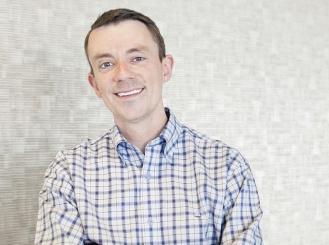Jul 13, 2023
Mark A. Lewis, MD, is the director of gastrointestinal oncology at Intermountain Health, Murray, Utah, and vice president of American Multiple Endocrine Neoplasia Support. Since discovering that he had multiple endocrine neoplasia type 1 (MEN1) during the first week of his fellowship, Dr. Lewis has gone on to be an active social media influencer in the cancer care community, bringing perspectives as both a patient and a provider. Learn why he works to amplify patient voices and why he volunteers his time with Conquer Cancer.
What initially drew you to the field of oncology?
ML: My father was diagnosed with cancer when I was 8 and passed away when I was 14. This disease has been a part of my life for almost as long as I can remember. After my dad passed away, his oncologist took me under his wing as an apprentice of sorts. Seeing the practice from both sides—as the son of a patient, then as the mentee of his physician—taught me a tremendous amount about the field. I was drawn to it by my head and by my heart. I liked the science; I loved the delivery of care.
What brings you the most joy when caring for patients?
ML: My father wrote that “the crisis [of cancer] provides the opportunity now—however brief or lengthy—to discard the trivial and the shallow, and to fill every moment and relationship with meaning, intensity, and value.”
Witnessing patients use their time intentionally, no matter how much of it remains, is an incredible reminder of life’s fleeting preciousness. Carpe diem means something different when you must confront the numbering of your days, and watching their purposeful legacy-building is a vital reminder that memory can supersede mortality.
Why do you volunteer as a podcast host for Your Stories: Conquering Cancer?
ML: I am a huge believer that narrative medicine is underrated for its capacity to transform health care. As humans, we are drawn to storytelling, and podcasting is just a modern continuation of the oral tradition. Yes, our most rigorous studies require large numbers to undergird their conclusions with statistical power, but each patient participates in a single ongoing experiment where n=1. Your Stories acknowledges this, approaching cancer not as some overwhelming monolith but as a disease we can conquer one person at a time.
What drives your interest in gastrointestinal cancers, neuroendocrine tumors, cancer syndromes, and hereditary cancers?
ML: I am a patient-physician, and I always live on the front part of that hyphenate. On my first day of fellowship training in oncology, I realized there was not just misfortune leading to my father’s far-too-early death at 49, but a family curse of sorts. I traced a mutation back to my paternal grandfather and then forward to me.
From that moment on, I had no choice but to see the field through the lens of inherited risk, and my greatest threat to my own longevity lies in my pancreas, where the same neuroendocrine tumors that killed Steve Jobs and Aretha Franklin could yet grow and metastasize to my liver. Once I shared my own congenital cancer-causing defect online, it attracted similarly affected patients. Now, I practice in a beautiful feedback loop where they come to me for professional counsel, and I also learn from them.
Why is donor-funded research necessary for advancements in treatment to continue?
ML: We are fumbling in the dark to make any progress in oncology without thoughtful research. That endeavor—so crucial to iterative improvement of our understanding—requires a considerable investment of time, resources, expertise, and funding.
How do your personal experiences with cancer shape your approach to caring for patients?
ML: One informs the other. Empathy is hard-won, and it would be a real shame to squander it. While I never condescend to presume that I can know precisely how any given patient feels, I have wrestled personally with the life-or-death implications of choosing a cancer treatment that most aligns with my values and goals. It’s clear to me that the two lodestars of oncology are longevity and quality of life. Everything else is some endpoint of varying fidelity to those prized outcomes.
Can you share a standout memory of volunteering your time with Conquer Cancer, and tell us what made this experience so meaningful to you?
ML: Some of the podcasts have included interviews with children, either of parents affected by cancer or, heartbreakingly, because the children were patients themselves. I had a 2-week rotation in pediatric oncology early in my medical training and quickly realized I didn’t have the emotional stamina to watch children suffer from the wrong kind of growth; not their natural maturation, but the cruel affliction of malignancy arising at such a young age. Every time I speak to one of these children, they seem so wise beyond their years, and they can remind even the most jaded adult among us that we should not take our duration for granted. Getting older is a gift that is not bestowed upon all.
What do you want donors and ASCO members to know about the impact of Conquer Cancer’s Grants and Awards program? What makes Conquer Cancer unique?
ML: There are few other charitable organizations I know of that are such responsible stewards of donor-funded research as Conquer Cancer. These generously provided funds are then very selectively distributed to talented researchers whose ideas and contributions are most likely to “move the needle” toward a brighter future, where every patient is given a more equitable chance to conquer cancer.

